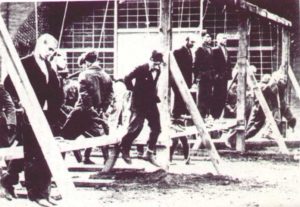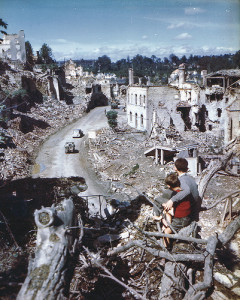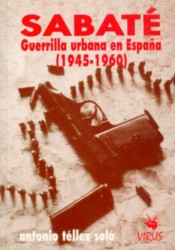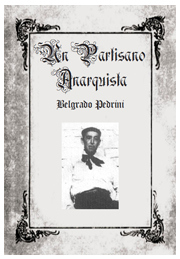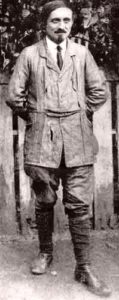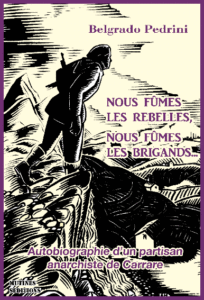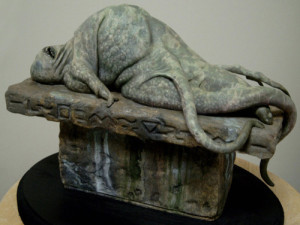Tag Archives: 1945
Anarchist Activity in France during World War two
summary of material from the C.I.R.A., Marseille, BULLETIN No. 21/22 (Summer, 1984), which had the theme Anarchists and the Resistance.
Jean Rene Sauliere (alias Andre Arru) was one of the anarchist participants in the French resistance to the Nazis and their Vichy collaborators during World War II. He was born in Bordeaux in 1911 and became an orphan during the First World War. In early adulthood he made his living as a traveling salesman. He belonged to the Bouches-du-Rhone section of the Federation of Free Thinkers, and was elected its president. He also joined the anarchist movement and became a pacifist. Several years before the outbreak of the 1939-1945 conflict, he decided that he would never participate in any war. Like other pacifists and revolutionaries, he saw war as a solution worse than the evil it was supposed to combat. By 1939, Sauliere decided that he would not voluntarily submit to arrest for refusing to serve in the military if called.
Continue reading Anarchist Activity in France during World War two
“SABATÉ Guerrilla urbana en España” (libro-pdf)
“SABATÉ Guerrilla urbana en España (1945-1960)”, de Antonio Téllez
Editorial Virus [Ver sección “Memoria”]
SABATÉ Guerrilla urbana en España
Continue reading “SABATÉ Guerrilla urbana en España” (libro-pdf)
Un Partisano Anarquista. Belgrado Pedrini.
Durante el fascismo italiano, en la zona de Carrara, operaban diversas formaciones partisanas anarquistas, SAP-FAI, Lucetti, “Lunense”, “Elio”. Esta última fue la primera formación anárquica que operó en la región apuana.
Continue reading Un Partisano Anarquista. Belgrado Pedrini.
Émile Armand (21 texts)
Is the Illegalist Anarchist our Comrade?
Émile Armand (1911)
(Notes: From “L’Illégalist anarchiste, est-il notre camarade?” Paris and Orleans, Editions de “l’en-dehors.” [n.d].Translated for marxists.org by Mitchell Abidor.)
When we consider the thief as such we can’t say that we find him less human than other classes of society. The members of the great criminal gangs have mutual relations that are strongly marked with communism. If they represent a survival from a prior age, we can also consider them as the precursors of a better age in the future. In all cities they know where to address themselves so they’ll be received and hidden. Up to a certain point they show themselves to be generous and prodigal towards those of their milieu. If they consider the rich as their natural enemies, as a legitimate prey — a point of view quite difficult to contradict — a large number of them are animated by the sprit of Robin Hood; when it comes to the poor many thieves show themselves to have a good heart.
(Edward Carpenter: Civilization, its Cause and Cure.)
I am not an enthusiast of illegalism. I am an alegal. Illegalism is a dangerous last resort for he who engages in it, even temporarily, a last resort that should neither be preached nor advocated. But the question I propose to study is not that of asking whether or not an illegal trade is perilous or not, but if the anarchist who earns his daily bread by resorting to trades condemned by the police and tribunals is right or wrong to expect that an anarchist who accepts working for a boss treat him as a comrade, a comrade whose point of view we defend in broad daylight and who we don’t deny when he falls into the grips of the police or the decisions of judges. (Unless he asks us to remain silent about his case)
Continue reading Émile Armand (21 texts)
Nous fûmes les rebelles, nous fûmes les brigands, (aubiographie d’un partisan anarchiste de Carrare (Belgrado Pedrini)
par Belgrado Pedrini
Un certain goût pour la liberté
C’est l’histoire d’un jeune homme autodidacte de 18 ans qui s’engage dans la lutte révolutionnaire. Le parti fasciste est alors installé aux commandes de l’Etat italien depuis près d’une dizaine années. C’est l’histoire d’un anarchiste qui s’arme contre lui bien avant 1943, année du débarquement anglo-américain en Sicile, de la chute provisoire de Mussolini et des débuts officiels de la Résistance. Bien avant la fin de la trêve entre le fascisme brun et le fascisme rouge. Celle qui a par exemple conduit le Parti communiste italien, inféodé à Togliatti, à proposer à ses militants d’infiltrer les indispensables structures de masse créées par les fascistes pour un jour les retourner à son propre service.
Un jour… L’attente dans une nuit sans fin, en cette période qui précède le second conflit mondial. Des poignées d’hommes courageux et déterminés sont pourtant prêts à risquer le tout pour le tout plutôt que de continuer à survivre sous un tel régime. Comme sous n’importe quel régime d’ailleurs, dès lors qu’il est placé sous le règne de l’Etat, de l’exploitation ou de la marchandise.
Continue reading Nous fûmes les rebelles, nous fûmes les brigands, (aubiographie d’un partisan anarchiste de Carrare (Belgrado Pedrini)
La Bomba
Dwight Macdonald
ANTIFA Friuli
La barbarie comincia da uno
André Prudhommeaux
I giornali rigurgitano di dettagli sulle macabre scoperte fatte dagli Alleati nei campi di concentramento tedeschi. D’altronde non c’è dubbio che era ancora peggio di quanto potessero temere i più pessimisti. Nel lungo elenco di massacri che accompagna la storia universale, i dirigenti del Terzo Reich cancellano persino i ricordi più sinistri, sia per numero di vittime sia per novità di procedimenti messi in atto per sterminarle.
Continue reading La barbarie comincia da uno
